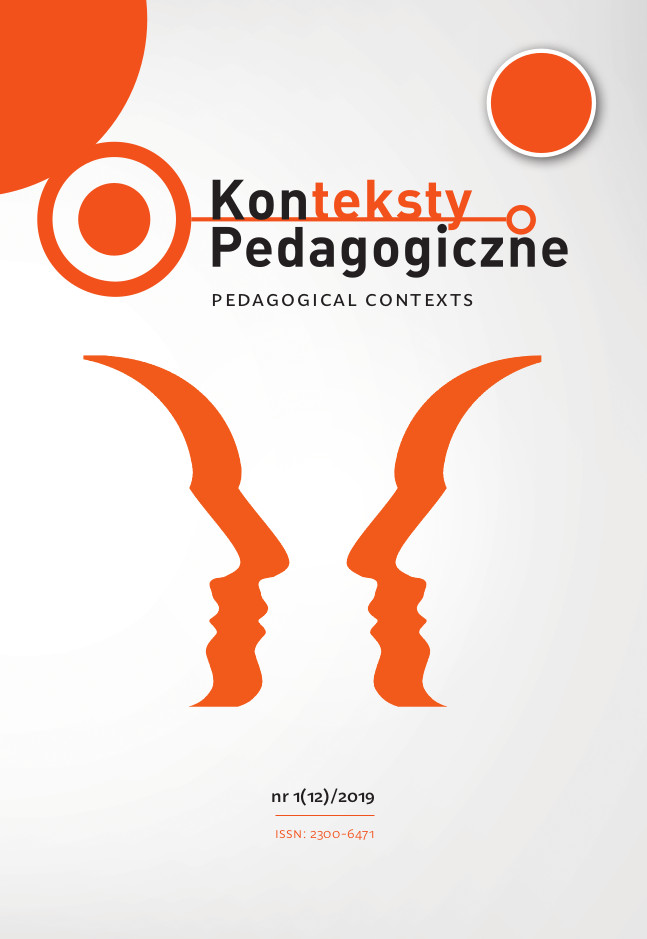Abstract
The article deals with an analysis of grade 4 and 5 textbook exercises related to the topic of People and Time according to their type. We categorize the method of content analysis (the type of learning exercise was the specific transformation) and compare the types of learning exercises in the textbooks issued by six publishers. A revision of Bloom's Taxonomy is used for categorizing the learning exercises. The research sample consists of 2101 learning exercises related to history lessons. The results show that the majority of the exercises are related to memory (over 50% of all exercises). Conversely, learning exercises of a higher cognitive difficulty (creative, analytical, or synthetic) only appear sporadically in the textbooks. This trend is similar for the textbooks of all the researched publishers.
References
Demircioglu, I.H. (2010). Turkish History Teachers’ Perceptions of Primary Sources in History Textbooks. The New Educational Review, 21(2), 71–80.
Klapko, D. (2006). Evaluace učebnic jako cesta k optimalizaci výchovně-vzdělávacího procesu. (Evaluation of textbooks as a way to optimize the educational process). In: J. Maňák and D. Klapko (eds.), Učebnice pod lupou (pp. 45–51). Brno: Paido.
Knecht, P. and Lokajíčková, V. (2013). Učební úlohy jako příležitosti k rozvíjení a dosahování očekávaných výstupů: analýza koherence učebnic a RVP ZV. (Learning exercises as opportunities to develop and achieve expected outcomes: textbook coherence analysis and GEP). Pedagogika, 63(2), 167–181.
Krathwohl, D.R. (2002). A revision of Bloom's taxonomy: An overview. Theory into practice, 41(4), 212–218.
Martincová, J. (2011). Analýza učebních úloh z vlastivědy. (Analysis of learning exercises from national history and geography). Dissertation. Brno: Masarykova univerzita.
Průcha, J. (ed.). (2009). Pedagogická encyklopedie. (Pedagogical Encyclopedia). Praha: Portál.
Průcha, J., Walterová, E. and Mareš, J. (2003). Pedagogický slovník. (Pedagogical Dictionary). Praha: Portál.
Jeřábek, J. and Tupý, J. (2017). General Educational Program for primary school education. Praha: VÚP.
Salamonová, H. (2011). Učební úlohy ve vybraných učebnicích vlastivědy na ZŠ. (Learning exercises in selected textbooks of national history and geography at primary school). Brno: Masarykova univerzita.
Sikorová, Z. and Červenková, I. (2014). Styles of Textbook Use. The New Educational Review, 35(1), 112–122.
Stará, J., and Krčmářová, T. (2014). Užívání nových učebnicových materiálů učiteli 1. stupně ZŠ. Pedagogická orientace, 24(1), 77-110.
Šimik, O. (2014). Učebnice přírodovědy pohledem pedagogického výzkumu. (Elementary science textbooks from pedagogic research point of view). Ostrava: Ostravská univerzita v Ostravě.
Šimik, O. (2017). Syntactic and semantic difficulty of text in the history part of textbooks for the educational field of the “human and his world”. Konteksty Pedagogiczne, 1(8) 183–201.
Vaculová, I., Trna, J. and Janík, T. (2008). Učební úlohy ve výuce fyziky na 2. stupni základní školy:
vybrané výsledky CPV videostudie fyziky. (Learning exercises in teaching physics at elementary school: selected ECR results of the video study of physics). Pedagogická orientace, 18(4), 35–56.
Vránová, O. (2012). Difficult Learning Tasks in Biology Curriculum. The New Educational Review, 30(4), 30–44.
In accordance with the recommendation of the Ministry of Science and Higher Education, which aims to counteract the practice of “ghostwriting” and “guest authorship,” all authors submitting their text for publication should attach an author’s statement which declares the contribution of each of the authors to the article. The printed and signed statement should be delivered by mail or other means to editor-in-chief Joanna Skibska or sent in the form of a scan to the following e-mail address: redakcja@kontekstypedagogczne.pl. The authors will not receive remuneration for publishing their papers. The editors reserve the right to make minor editorial changes to the articles which will not affect the substance of the article. We encourage all authors to prepare their articles in accordance with the guidelines for manuscript preparation. Download pdf file.
Authors transfer all copyrights and grant the journal the right of first publication with the work simultaneously licensed under a Creative Commons Attribution License that allows others to share the work with acknowledgement of the work's authorship and initial publication in this journal. All authors agree to the publishing of their email addresses, affiliations and short bio statements with their articles during the submission process.

